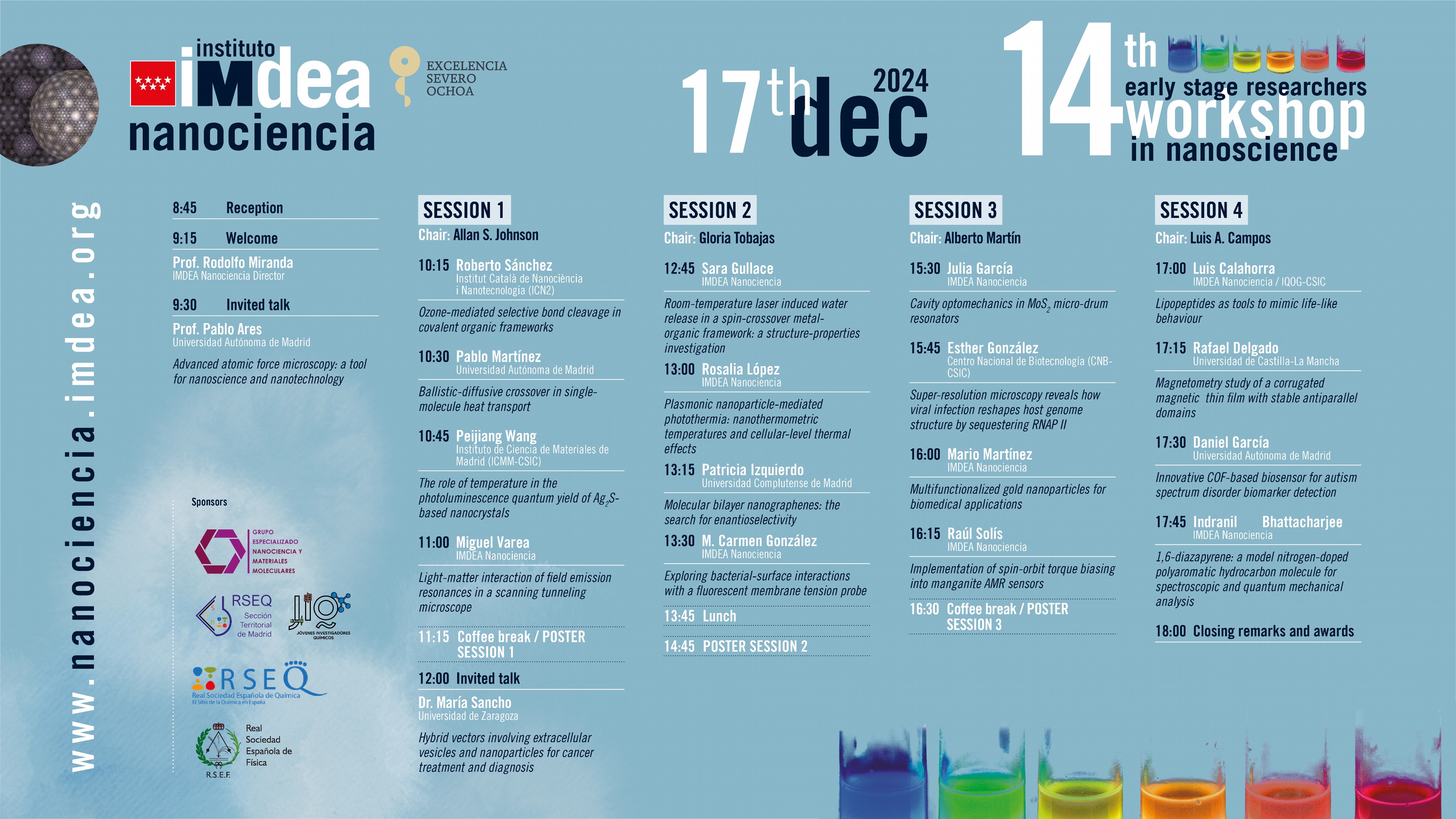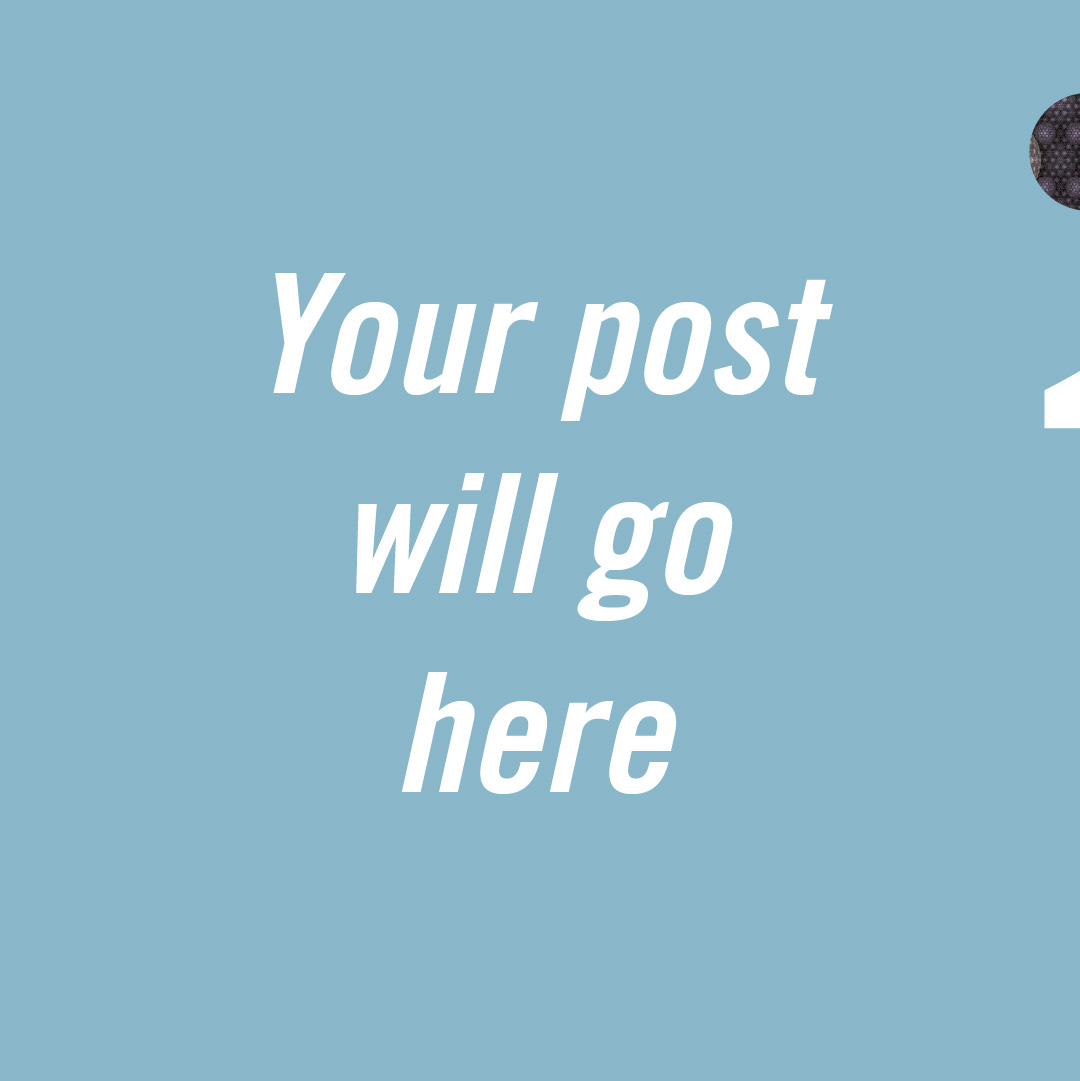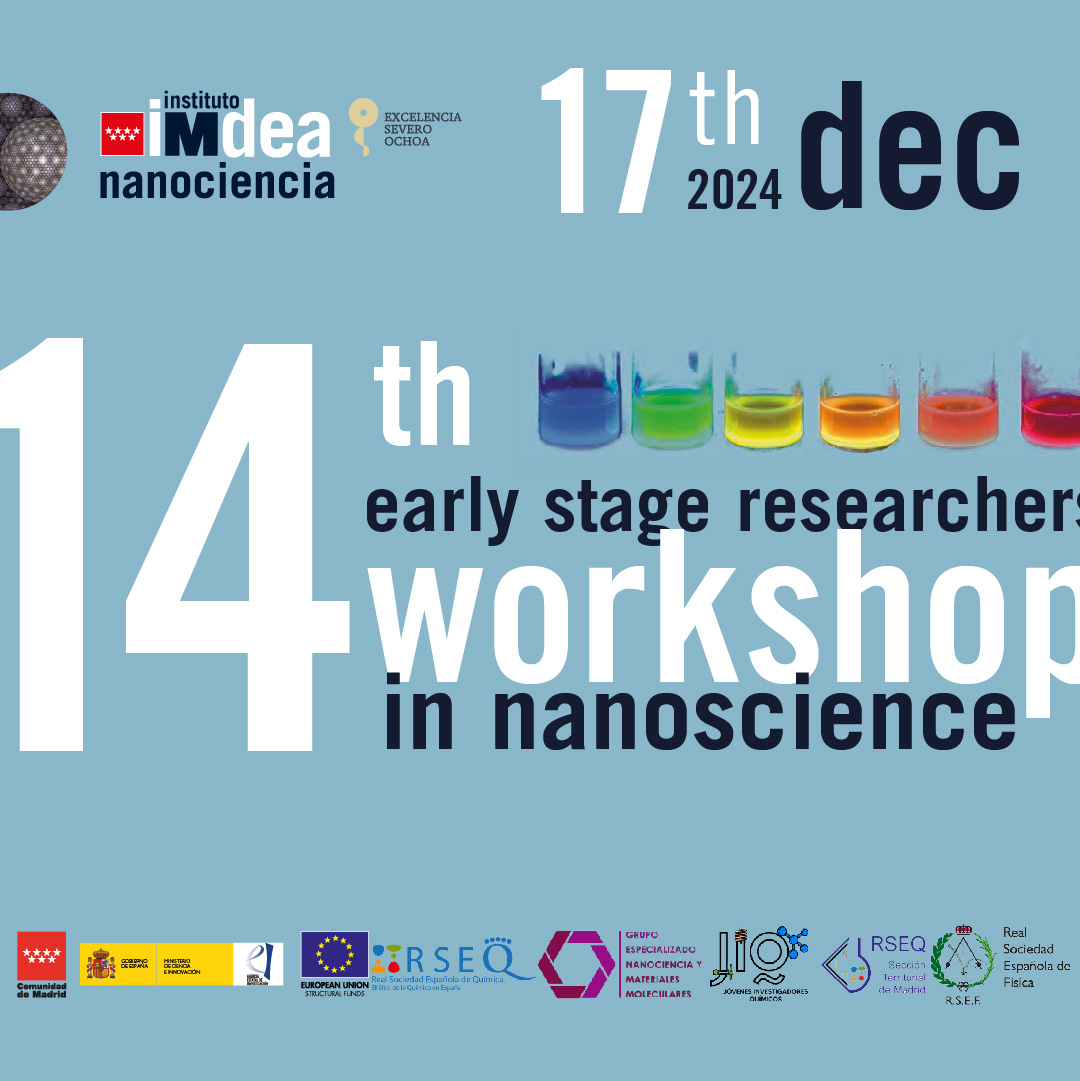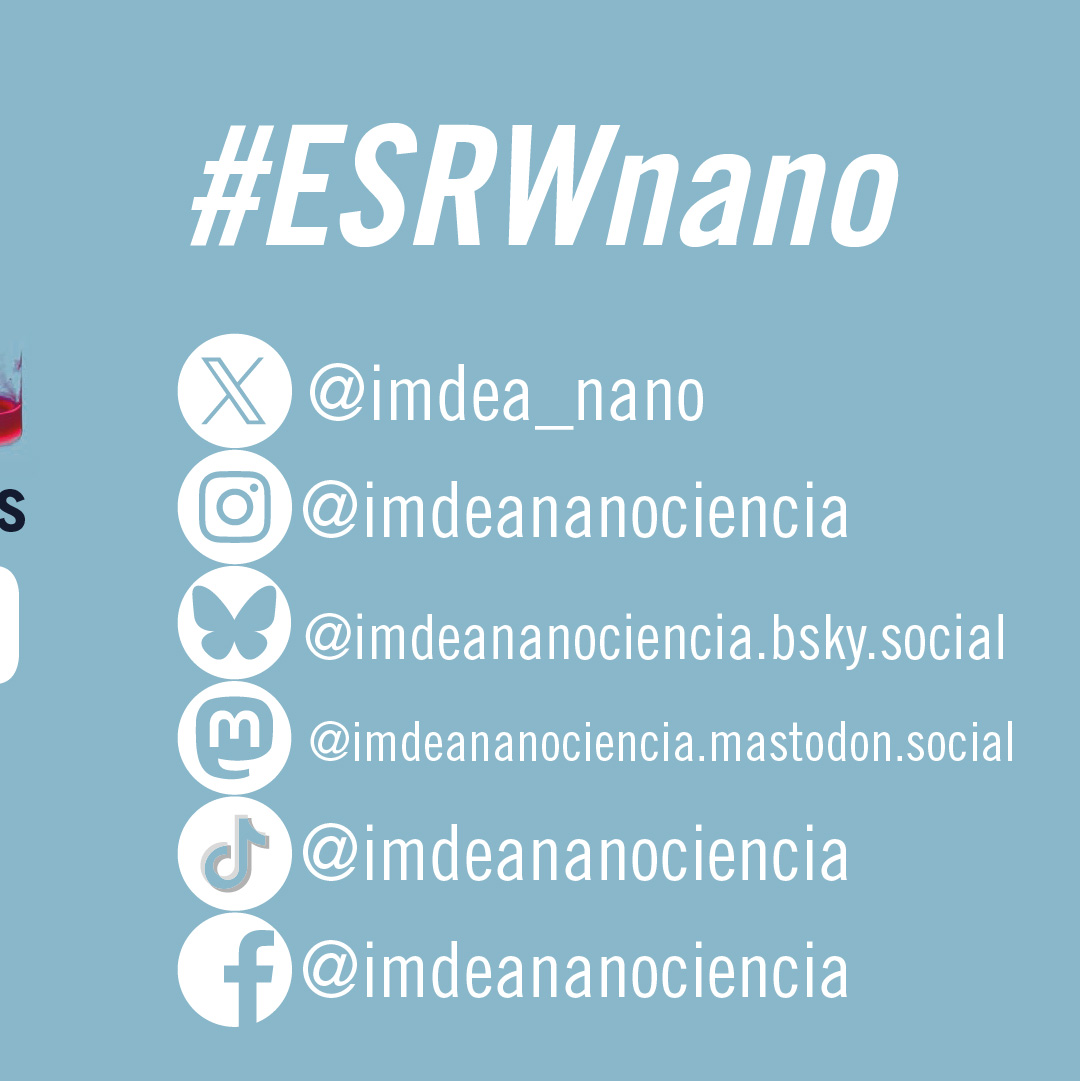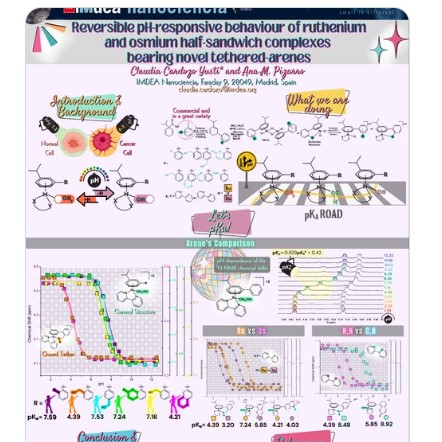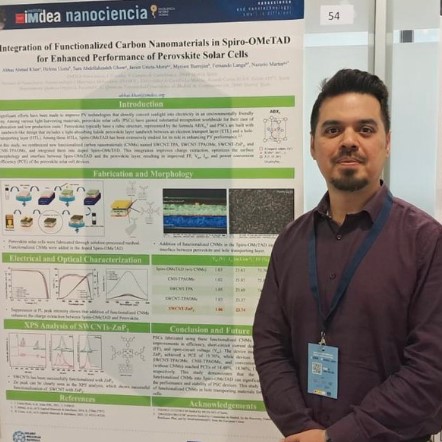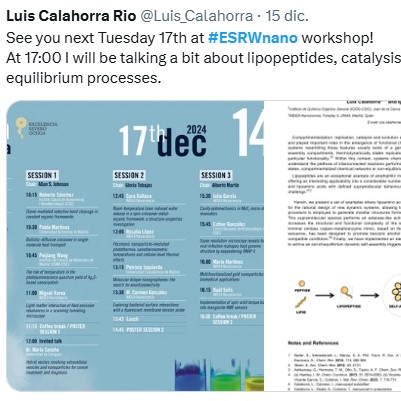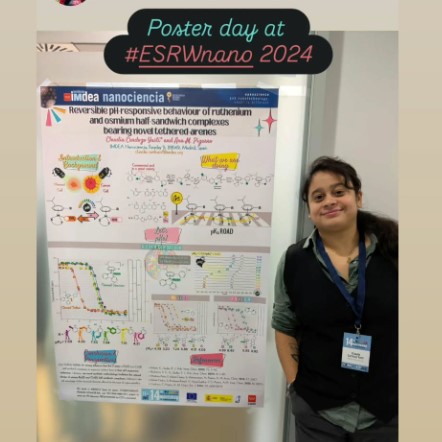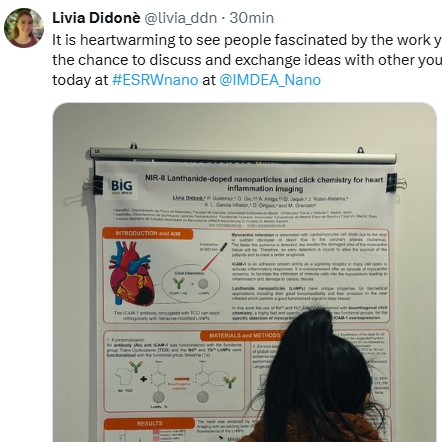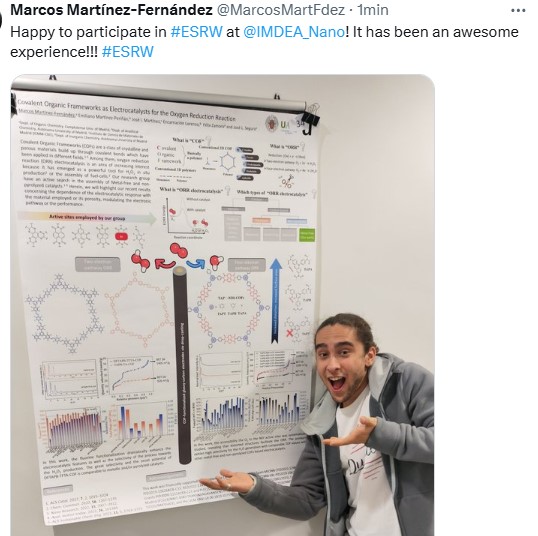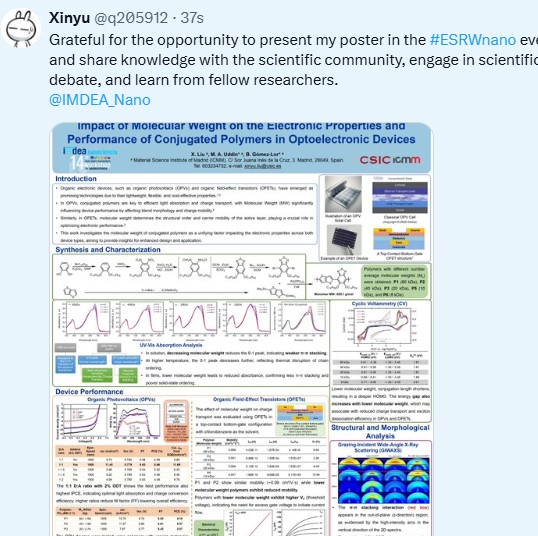14th Early Stage Researchers Workshop in Nanoscience
-

17th December 2024
Registration deadline: 11th November 2024. Extended to the 18th November, 15:00 CET.
Invited speakers:
*Click on the names to expand and see the abstracts and biographies.Dr. Pablo Ares (Universidad Autónoma de Madrid)
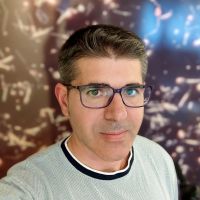
Advanced atomic force microscopy: a tool for nanoscience and nanotechnology
Abstract
Scanning Probe Microscopy (SPM) techniques (STM, AFM, SNOM…) have been crucial for the emergence of Nanoscience and Nanotechnology. These fields represent new frontiers to study a variety of physical, chemical and biological phenomena on a scale at least 10000 times smaller than the world we normally observe. In this talk, I will present my research of the last years on low dimensional systems through the use and development of advanced Atomic force Microscopy (AFM) tools. I will start with a brief introduction on instrumental and methodological contributions to the advancement of nanoscale characterization techniques, including a novel and simple method to fabricate nanoelectrodes by AFM manipulation and assembly of metal nanowires. Then I will comment the work done on tuning graphene properties by applying ultrahigh pressures locally, along with the isolation of antimonene, one of the few elementary 2D allotropes. I will go on showing the electrical characterization of different low dimensional systems: long molecular wires, and ultrathin hexagonal Boron Nitride (hBN) layers.
Biography
Pablo Ares completed his studies in Physics at the Universidad Complutense de Madrid in 2003, and then joined Nanotec Electrónica S.L. (a company devoted to the design, development and commercialization of scanning probe microscopes, SPMs) as an Application Scientist. In 2014, he moved to the Department of Condensed Matter Physics at the Universidad Autónoma de Madrid (UAM), where he obtained his Ph.D. in 2017. He then joined the Graphene Group at the University of Manchester (UK), where he worked with Prof. Kostya Novoselov and Dr. Laura Fumagalli as a Marie Sklodowska Curie Fellow. In 2020, he returned to the UAM as an Assistant Professor & IFIMAC Junior Leader, where he is currently a Ramón y Cajal Fellow since 2022. He has obtained national and international competitive funding, including a prestigious ERC Starting Grant 2024 for his project (HeaT2Defects). His research activity has a strong multidisciplinary character within the framework of nanoscience and nanotechnology, focusing on novel low-dimensional systems, with particular attention to 2D materials, using and developing SPM tools.
Dr. María Sancho Albero (Universidad de Zaragoza)
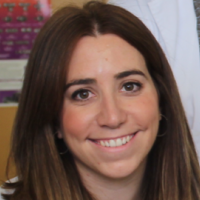
Hybrid vectors involving extracellular vesicles and nanoparticles for cancer treatment and diagnosis
Abstract
Cancer is a multifaceted global health issue that continues to demand new solutions. The advent of nanotechnology has added nanoparticle (NPs)-based approaches to the available toolbox in cancer therapy and diagnosis. Indeed, there are now nanosystems with extraordinary properties, including drug loading, antibody functionalization, imaging agents and remote activation capabilities. However, these promising advances have so far failed to materialize in the clinic, largely due to a lack of selective delivery to tumors. Nanomedicine was heralded as the solution to this lack of the treatment efficacy against cancer. But, the delivery of therapeutic nanoparticles (NPs) to cancer sites needs to be dramatically improved. In the last years, the “Trojan Horse” concept has been postulated as an emerging strategy for enhancing tumor targeting efficiency. Among “Trojan Horse” strategies, extracellular vesicles (EVs) appear to hold the greatest potential as tools for the solution of the targeting challenge. They are nanovesicles (50-120 nm of diameter) from endocytic nature secreted by almost all cell types. In this communication, I will present an overview of the combination of multidisciplinary approaches based on the latest advances in the field of nanomedicine and in the area of the EVs for efficiently loading EVs with therapeutic NPs (for instance with optical hyperthermia properties or with bioorthogonal catalytic activity) or imaging agents, and selectively delivering them to target tumor sites. I will present some of the last novel strategies developed for the encapsulation and engineering of therapeutic nanotechnological materials within EVs and their application for cancer treatment and diagnosis.
Biography
BSc in Biotechnology (2015), MSc in Nanostructured Materials (2016) and PhD in Chemical Engineering by the University of Zaragoza (2020) holding a predoctoral FPU fellowship from the Spanish Ministry of Education. During her PhD she joined the groups of Prof. Andrew De Mello (ETH Zurich) and of Prof. Pierangelo Metrangolo (University of Milan). In 2021 she moved to the Mario Negri Institute (Milan), joining the group of Prof. Luisa De Cola as postdoctoral researcher where she was granted with a two-year AIRC-for Italy fellowship focused on the design of breakable on demand and stimuli-responsive organosilica NPs for biomedical applications. In 2023, she obtained a prestigious Postdoctoral AECC Talent Fellowship and moved back to Spain to the NFP group led by Prof. Jesús Santamaría, part of INMA from the University of Zaragoza. In 2024, she gained a Marie Sklodowska Curie individual Fellowship that will start in the following year. Main current research lines: 1) the combination of nanostructured materials, molecular biology and biochemistry with physicochemical, microfluidics and nanotechnological techniques in the field of extracellular vesicles; and in 2) the development of novel selective nanoscaled-drug delivery tools for cancer treatment and diagnosis.
-
The 14th edition of the Early Stage Researchers Workshop in Nanoscience will be held on 17th December 2024 at the conference hall of IMDEA Nanociencia. The event is open to early stage researchers (PhD students and postdocs) who are invited to present their work as oral or poster communications.
The poster session of this 14th Early Stage Researchers Workshop in Nanoscience will be celebrated in parallel to the oral communications. All poster communications will be displayed in the hall of IMDEA Nanociencia on the 17th of December, from 9.00 to 17.00 h.
An award will be given to the Best Oral Communication, Best Poster Communication, and Best Social Media Communication, awarded during the closing remarks thanks to the sponsor of the workshop.
Everyone is welcome to the event and whilst there is no cost, registration is required. Please, follow the steps on the "Registration" tab.
Throughout this meeting we will see the different research lines of Nanoscience currently being developed by a growing number of groups and discuss their latest results. Due to the variety of disciplines that Nanoscience embraces, we would like to remind that the audience will be diverse including physicists, chemists or biologists and therefore we ask the presenters to adjust their contributions to this audience.
-
Scientific committee
Dr. Allan S. Johnson
Dr. Alberto Martín
Dr. Pierre Pantaleón
Dr. Angelo A. Beratto
Dr. Gloria Tobajas
Dr. Luis A. Campos
Dr. Raquel UtreraOrganising committee
Dr. Manuela GarnicaDr. Emilio M. PérezDr. Valle PalomoDr. José Ángel SilvaDr. Sara HernándezDr. M. Jesús VillaDr. Elena AlonsoLaura Ortega -
The workshop will be held at the Conference Room of IMDEA Nanociencia.
Postal address: C/ Faraday, 9
Campus de Cantoblanco
28049 Madrid
SpainContact the Organising Committee by email at: This email address is being protected from spambots. You need JavaScript enabled to view it.
How to arrive to IMDEA Nanociencia:
From Madrid (city centre)
- By train (Cercanías)
- Line C4 (Alcobendas-San Sebastián de Los Reyes/Colmenar Viejo), stop at “Cantoblanco Universidad” + 15 min. walk.
- By bus
- Only from “Plaza de Castilla” bus station. Line 714, stop at “Newton-Fco. Tomás y Valiente” + 3 min. walk.
“Plaza de Castilla” is connected to metro lines 1, 9 and 10.From the airport Adolfo-Suárez/Barajas
- By train (Cercanías)
- Line C1 till “Chamartin” station and change to line C4 (Alcobendas-San Sebastián de Los Reyes/Colmenar Viejo), stop at “Cantoblanco Universidad” + 15 min. walk.
- By bus
- Only from Terminal 4. Line 827, stop at “Newton-Fco. Tomás y Valiente” + 3 min. walk. There is a free shuttle bus that connects all terminals of the airport.
By taxi
- Taxi call centre: +34 91 547 8200, +34 91 371 2131.
- From the airport a flat fare of 30€ applies.
-
The #ESRWnano Social Media Scientific Session is an online event held over the internet with the purpose of encouraging the participants of 14th Early Stage Researchers Workshop in the communication of their results using social media platforms, expanding their network and fostering creativity.
The event will be held on the 17th December 2024 from 9:00 to 15:00 h.
How to participate
- Share a post of your research on the 17th December. The format is free. Examples: animated posters, reels, TikTok video, photography with your poster, etc.
- Use the hashtag #ESRWnano and the handle of IMDEA Nanociencia in each social network: @imdeananociencia.bsky.social (Bluesky), @IMDEA_Nano (X), @imdeananociencia (Instagram, TikTok), This email address is being protected from spambots. You need JavaScript enabled to view it..
- Discuss and answer the questions from the community. We encourage you to engage in scientific debate by commenting on other posts and sharing research ideas.
Please, tag IMDEA Nanociencia and the hashtag #ESRWnano in your post along with an image of your poster, photography, video or animated art of your research. Make sure your post is public and others can discover it. IMDEA Nanociencia will be reposting the communications in order for everyone to follow the discussion online. If you notice your post is not reposted, please write the committee at This email address is being protected from spambots. You need JavaScript enabled to view it..
The Best Social Media Communication will be decided by the scientific committee, according to the a) scientific content (50%), b) creativity (30%) and c) interactivity (replies, likes and impressions, 20%), and will be awarded with a prize during the closing session.
↓ Your #ESRWnano post will be reposted in this wall ↓





